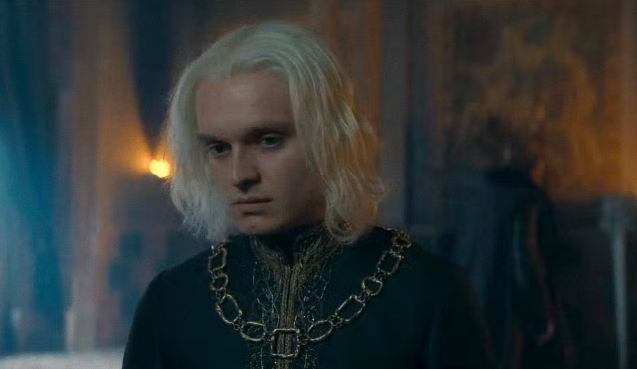I’m Shocked By How Much House Of The Dragon Season 2 Makes Me Like King Aegon, Despite Being Team Black
House of the Dragon season 2 does a good job of developing its main characters, but I’m particularly surprised at the direction it’s taken King Aegon II Targaryen in. With the Dance of the Dragons properly beginning, Aegon is getting more focus than before. While the show’s real “main” characters are still Rhaenyra Targaryen and Alicent Hightower, the fact that Aegon is the one on the Iron Throne as the civil war begins demands he has more to do.
Aegon was fine in House of the Dragon season 1, but a combination of time jumps, recasts, and other characters – such as his father, King Viserys I Targaryen – meant he didn’t get the same amount of depth as the likes of Rhaenyra and Alicent. That’s changing in season 2, though. This is not me saying he’s a good person – he’s still a bad husband, a bad father, a bad king, and generally a piece of s**t – but it makes me like watching the character far more than I expected, especially after House of the Dragon season 2, episode 2’s ending.
House Of The Dragon Season 2 Shows Different, Better Sides To King Aegon

With King Aegon taking more of a central role in things – rather than the war just happening around him and in his name – it means getting to see different sides to the character. Some of these were present in season 1 – his reluctance to be king, for example – but season 2 is able to expand upon and add to them in fascinating ways.
His grief manifesting as rage is brilliantly done, and while, yes, he does viciously murder Blood, it’s clearly portrayed as a very human response.
House of the Dragon season 2, episode 2 is a particularly great example of this. Following on from Blood and Cheese killing Prince Jaehaerys Targaryen, we get to see Aegon run through a variety of emotions. His grief manifesting as rage is brilliantly done, and while, yes, he does viciously murder Blood, it’s clearly portrayed as a very human response.
Even better (and more surprising, to me) is Aegon’s tearful breakdown towards the end of the episode. It balances perfectly with the fury from earlier on, showing just how far his grief extends and that, while he may be the king leading a civil war, he’s also still very young and in no way prepared for any of this.
He’s surrounded by people but incredibly isolated at the same time – a wife he can’t communicate with, a brother who believes he should be king instead, a mother who can’t even comfort him when he’s crying. Again, I’m not saying this makes his deeds forgivable in any way, but it makes him into a much more layered character.
Tom Glynn-Carney Is Giving One Of House Of The Dragon Season 2’s Best Performances

Tom Glynn-Carney didn’t leave much of a mark on me in season 1. That’s not meant as an insult, he certainly wasn’t bad, but House of the Dragon’s cast delivered so many great performances. Even among the younger ones, it was Ewan Mitchell who really stood out and caught the eye as Aemond Targaryen, as he was the more immediately compelling and entertaining of Alicent and Viserys’ children.
House of the Dragon is pretty self-serious and often grim (understandably so), but Aegon – like Viserys before him – brings in an element of comedy that’s much needed…
That’s changed in season 2, and Glynn-Carney is giving one of the best performances of the entire season – second only, I’d argue, to Emma D’Arcy as Rhaenyra. The actor is nailing every aspect of the character so far, and finding lots of little nuances within them, giving him a much greater emotional range. He’s great when portraying Aegon’s anger, because he’s never really frightening (unless you ask Blood, I guess), but instead you can see the cracks of vulnerability he’s trying to cover up.
He’s also bringing out one of the most important parts of the show, which is humor. House of the Dragon is pretty self-serious and often grim (understandably so), but Aegon – like Viserys before him – brings in an element of comedy that’s much needed, and a lot of that is down to Glynn-Carney’s performance and line delivery (his “abed?!” is a prime example). Crucially, like Paddy Considine before him, he finds the right balance between comedic and tragic, with a bit of pathetic thrown in, that makes him so enjoyable to watch, without needing to root for him, exactly.
House Of The Dragon Needed More Balance Between The Greens And The Blacks

If I’ve got to pick a side between House of the Dragon’s Greens and Blacks, then I’m with the latter. Rhaenyra has the rightful claim based on being named Viserys’ heir, and she’s long been the most sympathetic character. The show has continually widened that gap, too: Aemond is great to watch, but he killed Lucerys, which makes the Blacks more sympathetic. The likes of Jacaerys Velaryon, Corlys Velaryon, and Rhaenys Targaryen are “good,” while Otto Hightower, Aegon, Alicent Hightower, et al, are “bad,” and Ser Criston Cole is the most loathsome character on TV right now.
However, good storytelling needs balance and nuance. Game of Thrones was at its best when it found moral conflicts with gray characters, rather than black and white, good vs. evil (though it had room for those). House of the Dragon is no different. The more complex and empathetic it can make the Greens, the better the show will be, and I think its characterization of Aegon – alongside more obvious tragedies such as the impact of Blood and Cheese upon Helaena – goes a long way to doing that, and makes it a much more interesting watch.

